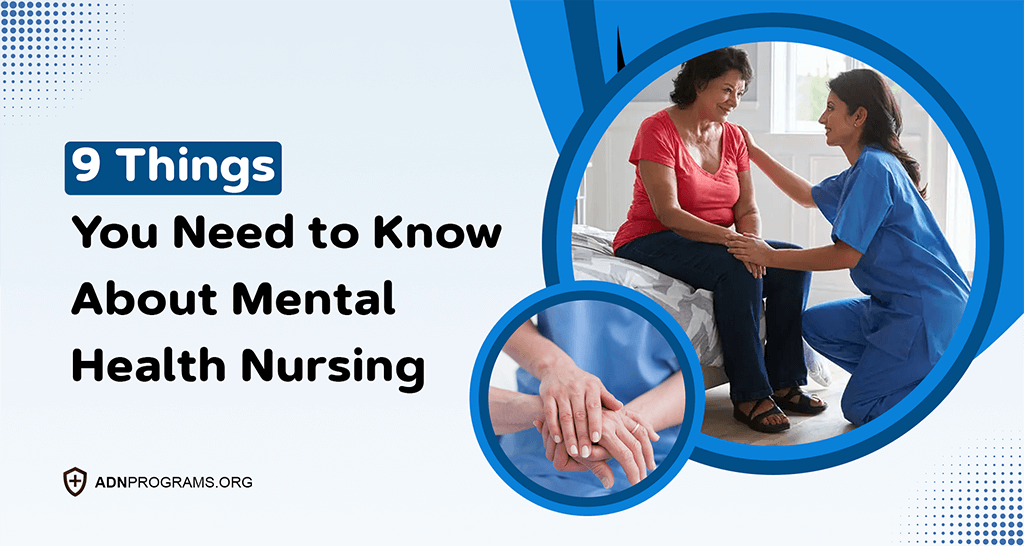
One of the most exciting things about pursuing a career in nursing is that you can take your career in so many different directions. While many nurses are content to work as general RNs, many others find themselves gravitating toward one specialization or another. For those who enjoy working closely with patients and their families to assist them with mental health concerns, mental health nursing is a viable option to pursue. Learn more about mental health nursing to get a feel if it's right for you by reading on below.
If you're curious about mental health nursing, the following facts are sure to help:
1. What is Mental Health Nursing?
As the name implies, mental health nursing, which is also known as psychiatric nursing, is a specialty within nursing that focuses on assessing the mental health needs of individuals, groups, families and even communities. Psychiatric nurses develop diagnoses and plans of care, and they provide mental health services from a nursing perspective.
2. Mental Health Nursing versus Psychiatric Nursing
For all intents and purposes, there are no real distinctions between mental health nursing and psychiatric nursing. In some contexts, the two terms may refer to slightly different things. In general, however, they are used interchangeably. When looking for certification programs and continuing education opportunities, a focus on either mental health nursing or psychiatric nursing should work.
3. Basic Mental Health Nursing versus Advanced Practice Mental Health Nursing
Like many specializations within nursing, mental health nursing may be practiced by basic level nurses, or RNs, or by advanced practice nurses, which are typically known as nurse practitioners. To pursue a career as a basic level mental health nurse, you'll need your RN license and should find employment within a mental health facility. To pursue a career as a Psychiatric Mental Health Advanced Practice RN, or PMH-APRN, you will need a master of science in nursing, or MSN, with a specialization in psychiatric nursing. Alternatively, you may wish to pursue your doctor of nursing practice, or DNP, with a related specialization.
4. Typical Duties
Psychiatric and mental health nurses handle a variety of duties and responsibilities. First and foremost, they are registered nurses. Therefore, they are charged with many of the same duties as general nurses. However, they are also expected to interview and assess patients' mental health to diagnose conditions like anxiety disorders, substance abuse problems, mood disorders and dementia. They then develop individualized plans of care for patients to help them lead healthy, fulfilling lives. In the case of an advanced practice mental health nurse practitioner, they may be authorized to prescribe medications and to even run their own practices.
5. Specializations within Mental Health Nursing
Mental health nursing is a specialization within registered nursing. However, there are also sub-specializations within mental health nursing that you should be aware of to pursue the correct path for your career. These sub-specializations largely mirror those that can be found within general nursing, so they include things like gerontology and child and adolescent care. Other popular sub-specializations include substance abuse treatment and forensics. You are not required to move into a sub-specialization, but it may make sense if you tend to prefer working with certain populations.
6. How to Become a Mental Health Nurse
The first step in becoming a mental health nurse is completing nursing school and earning either an associate degree in nursing (ADN) or a bachelor of science in nursing, or BSN. Ideally, opt for the latter, as it makes you more hirable and gives you the opportunity to pursue an advanced degree later if you so choose. Next, take and pass the NCLEX-RN to get your RN license. From there, work full-time as a registered nurse for at least two years. You will need this experience to earn your certification from the American Nursing Credentialing Center, or ANCC. You will also need a minimum of 2,000 hours of clinical practice in psychiatric care within the last three years and at least 30 hours of continuing education in psychiatric mental health nursing within the last three years. With those requirements out of the way, you can take a certification exam and earn your certification in mental health nursing.
7. Where Do Mental Health Nurses Work?
Mental health nurses work in a variety of settings. They are found in regular hospitals as well as psychiatric hospitals, prisons and jails, schools that specialize in students with mental health needs, outpatient mental health facilities and home health care organizations, where they then visit patients in their homes to provide care.
8. What is the Typical Salary for a Psychiatric Nurse?
Before pursuing a career as a mental health nurse, you'd probably like to know how much you can expect to earn. The average annual salary for a basic-level mental health nurse in the United States is $78,575 as of early 2022. If you progress into becoming an advanced practice nurse and assume a role as a psychiatric nurse practitioner, you can expect an annual salary of around $111,010 as of early 2022. For most nurses, the extra pay more than makes up for the extra schooling that must be completed.
9. Is Mental Health Nursing Right for You?
How can you determine whether or not mental health nursing is right for you? One way to find out is by paying attention during your clinical rotations, as you are likely to spend some time in a mental health or psychiatric department. You might also consider volunteering for local mental health organizations and facilities. Ideally, you should have excellent communication and interpersonal skills.
If you enjoy working closely with people and want to help them overcome mental health issues that are holding them back in life, a career in psychiatric nursing may be right for you. With so many opportunities for advancement, it is a great career path for nurses from all walks of life.



